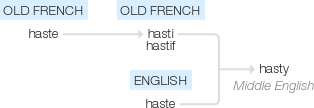Hasty
Middle English: from Old French hasti, hastif, from haste (see haste).
wiktionary
From Middle English hasty, of unclear origin. Likely a new formation in Middle English equivalent to haste + -y, found as in other Germanic languages (Old Frisian hastig, Middle Dutch haestigh (> Dutch haastig(“hasty”)), Middle Low German hastich(“hasty”), German hastig, Danish hastig, Swedish hastig(“hasty”)); otherwise possibly representing an assimilation to the foregoing of Middle English hastive, hastif (> English hastive), from Old French hastif (Modern French hâtif), from Frankish *haifst(“violence”), of same ultimate origin.
etymonline
hasty (adj.)
mid-14c., "early; demanding haste, urgent; quick-tempered, angry;" late 14c. "speedy, swift, quick," by 1500s, from haste (n.) + -y (2); replacing or nativizing earlier hastif (c. 1300) "eager, impetuous," from Old French hastif "speedy, rapid; forward, advanced; rash, impetuous" (12c., Modern French hâtif), from haste (see haste (n.)). Meaning "requiring haste" is late 14c. (this is the sense in hasty-pudding, 1590s, so called because it was made quickly); that of "eager, rash" is from early 15c. Related: Hastiness. Old French also had a form hasti (for loss of terminal -f, compare joli/jolif, etc.), which may have influenced the form of the English word.
